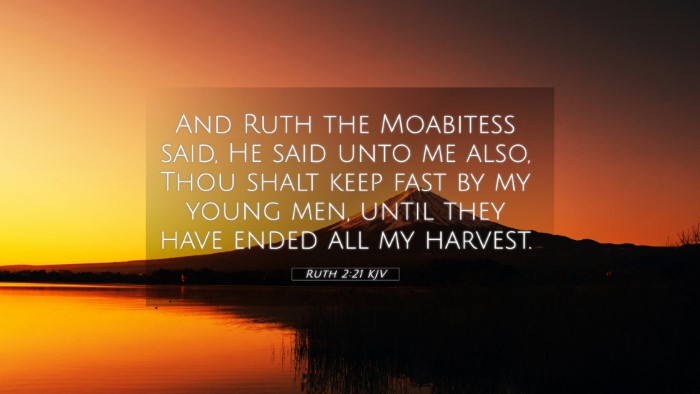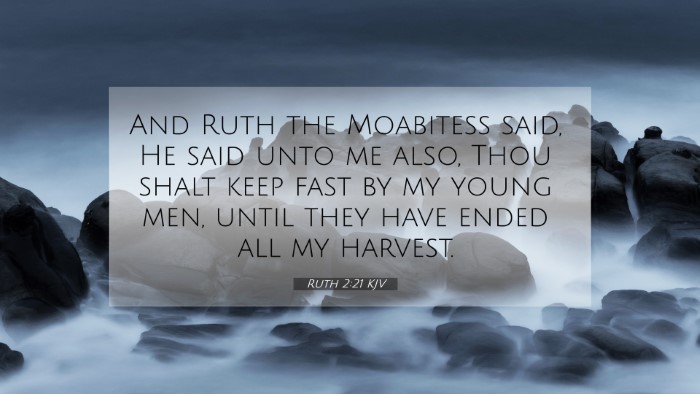Old Testament
Genesis Exodus Leviticus Numbers Deuteronomy Joshua Judges Ruth 1 Samuel 2 Samuel 1 Kings 2 Kings 1 Chronicles 2 Chronicles Ezra Nehemiah Esther Job Psalms Proverbs Ecclesiastes Song of Solomon Isaiah Jeremiah Lamentations Ezekiel Daniel Hosea Joel Amos Obadiah Jonah Micah Nahum Habakkuk Zephaniah Haggai Zechariah MalachiRuth 2:21 Similar Verses
Ruth 2:21 Cross References
And Ruth the Moabitess said, He said unto me also, Thou shalt keep fast by my young men, until they have ended all my harvest.
Uncover the Rich Themes and Topics of This Bible Verse
Listed below are the Bible themes associated with Ruth 2:21. We invite you to explore each theme to gain deeper insights into the Scriptures.
Ruth 2:21 Cross Reference Verses
This section features a detailed cross-reference designed to enrich your understanding of the Scriptures. Below, you will find carefully selected verses that echo the themes and teachings related to Ruth 2:21 KJV. Click on any image to explore detailed analyses of related Bible verses and uncover deeper theological insights.
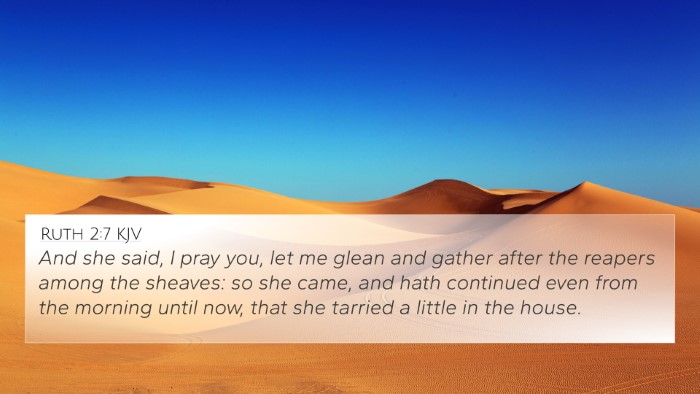
Ruth 2:7 (KJV) »
And she said, I pray you, let me glean and gather after the reapers among the sheaves: so she came, and hath continued even from the morning until now, that she tarried a little in the house.
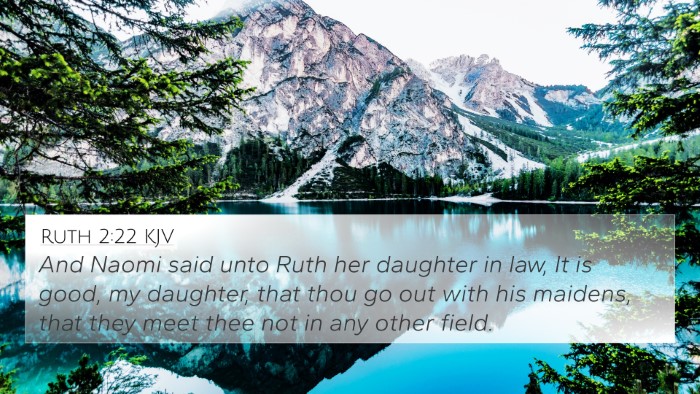
Ruth 2:22 (KJV) »
And Naomi said unto Ruth her daughter in law, It is good, my daughter, that thou go out with his maidens, that they meet thee not in any other field.
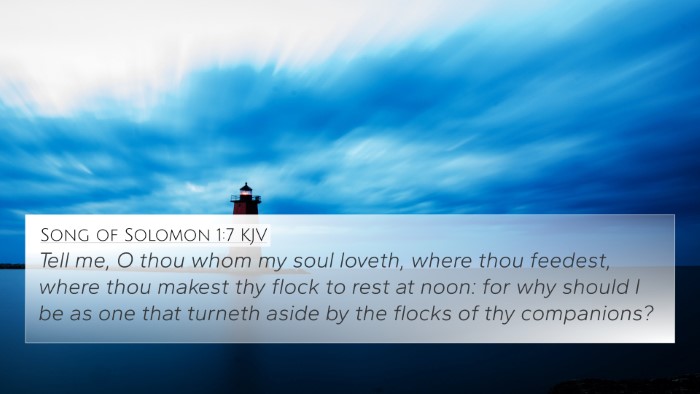
Song of Solomon 1:7 (KJV) »
Tell me, O thou whom my soul loveth, where thou feedest, where thou makest thy flock to rest at noon: for why should I be as one that turneth aside by the flocks of thy companions?
Ruth 2:21 Verse Analysis and Similar Verses
Understanding Ruth 2:21
Bible Verse: Ruth 2:21 - "And Ruth the Moabitess said, 'He also said to me, You shall stay close by my young men until they have finished all my harvest.'
Summary of Ruth 2:21
This verse reflects the continuation of Ruth’s commitment to glean in the fields of Boaz. It highlights her loyalty and the kindness she has found in Boaz, who instructs her to stay close to his young men, ensuring her safety and provision during the harvest.
Commentary Insights
The insights from well-known public domain commentaries help deepen our understanding of Ruth 2:21:
- Matthew Henry: Henry remarks on Ruth's character, emphasizing her diligence and humility. He draws connections between Ruth's labor and God's provision, noting that her willingness to learn and obey has placed her in a position to receive Boaz's protection and generosity.
- Albert Barnes: Barnes expands on the significance of Boaz's instructions, highlighting the cultural context of gleaning in Israel. He explains that Boaz’s actions were not only generous but also showed a protective instinct toward Ruth, offering her a safe environment to work.
- Adam Clarke: Clarke delves into the Hebrew terms used in this verse, noting that Ruth's identity as a Moabitess is significant. He interprets Boaz's invitation as a welcoming gesture, which serves to bridge the gap between Ruth’s origins and her new life in Israel.
Bible Verse Cross-References
Ruth 2:21 resonates with various other scriptures that enhance its meaning. Here are some relevant cross-references:
- Leviticus 19:9-10: This passage establishes the practice of leaving gleanings for the poor and the foreigner.
- Deuteronomy 24:19: Encourages kindness in leaving part of the harvest for the less fortunate.
- Psalm 146:7: Speaks to God's provision for the hungry, linking divine care with the actions of individuals like Boaz.
- Matthew 5:7: Jesus’ teaching on mercy reflects Boaz’s character and his generosity towards Ruth.
- Galatians 6:7: The principle of sowing and reaping embodies the faithfulness seen in Ruth and Boaz’s eventual union.
- 1 Timothy 5:8: This verse emphasizes the importance of providing for family, paralleling Boaz’s protective role over Ruth.
- Romans 15:4: Highlights how the Scriptures provide examples of hope and perseverance, mirroring Ruth’s determination.
Connections Between Bible Verses
The thematic connections between Ruth 2:21 and the above scriptures offer insights into the intertwining of love, grace, and divine providence in biblical narratives.
- Linking Bible scriptures: Ruth's actions exemplify the mercy commanded in the Old Testament laws regarding gleaning, resonating with the teachings of Jesus in the New Testament about caring for others.
- Scriptural cross-referencing: Both the Old and New Testament highlight the importance of community support, making Ruth's situation a prime example of inter-Biblical dialogue.
- Thematic Bible verse connections: The themes of loyalty and providence can be traced through these verses, creating a tapestry of God’s overarching plan for care and provision among His people.
Exploring Ruth's Commitment
Ruth's response to Boaz shows her dedication and faithfulness, which is a central theme throughout the book. Her experiences can be seen in light of greater biblical principles regarding humility and the rewards of loyalty.
- Comparison of Old and New Testament: Ruth's story prefigures the concept of the Gentiles being included in God’s family, as seen later in the New Testament.
- Cross-referenced themes: Ruth's gleaning reflects the call for believers to help others, similar to Jesus’ teachings about loving one’s neighbor.
Using Cross-References for Study
This verse serves as an excellent example for using tools for Bible cross-referencing. Readers can delve deeper into biblical texts, understanding how different verses interact and support one another.
- How to find cross-references in the Bible: By studying keywords, themes, and narrative structures, readers can identify and explore related passages.
- Bible cross-reference guide: Utilizing guides can enhance the study of connections between biblical texts, enriching the overall understanding of God’s message.
- Bible concordance: This resource can assist in locating passages that relate to specific terms or themes, offering a broader context for verses like Ruth 2:21.
Conclusion
Ruth 2:21 holds a rich significance in understanding the overarching themes of love, mercy, and divine providence found throughout Scripture. By examining related passages and their interconnections, readers can gain deeper insights into the biblical narrative, leading to a more profound understanding of God's plan and character.

